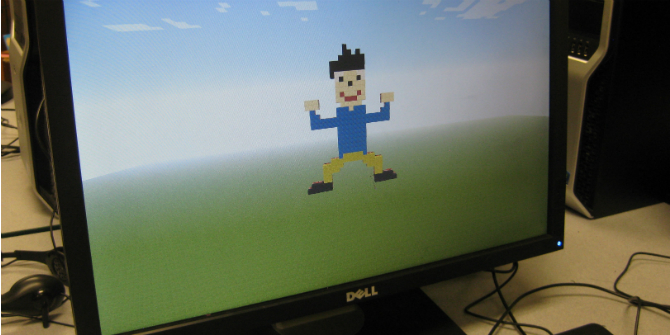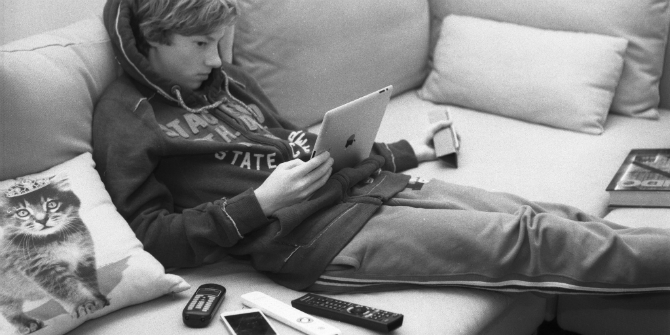 Finland has previously been considered to be technologically hostile, advocating for old-style children’s play at the risk of not preparing children for a digital future, argues Kristiina Kumpulainen from the Playful Learning Center in the Department of Teacher Education at the University of Helsinki, Finland. But this is about to change….
Finland has previously been considered to be technologically hostile, advocating for old-style children’s play at the risk of not preparing children for a digital future, argues Kristiina Kumpulainen from the Playful Learning Center in the Department of Teacher Education at the University of Helsinki, Finland. But this is about to change….
On 12 February 2015, the leading Finnish newspaper, Helsingin Sanomat, published an interview with a 37-year-old Finnish IT entrepreneur and father, who has established himself in the Silicon Valley by creating novel digital services later bought by Google and Groupon. At first glance, this article may appear as yet another instance of a Finnish innovator in the technology industry and the Finnish education system that facilitates such success stories. But, as the headline says: “The pioneer of social media says: Keep your children away from the online world and keep adults away from Tinder.”
The IT entrepreneur and father argues that children need stories and camping outdoors, not digital gaming and coding. Digital games, he explains, deprive children of vital chances to play, to the extent that this has created a need for ‘play consultants’ in schools to teach children how to play. As a response to these concerns, this dad is running a home school in his California residence, and has hired professional educators to teach his children poetry, archery, skateboarding and observing nature on the beach. A few other children from the neighbourhood have already joined his movement.
Digital reality for Finnish children
How widely is this view of parenting shared among Finnish parents? We have lots of survey data on the digital realities in Finnish homes and schools. For example, we know 29% of Finnish 0- to 3-year-old children and 66% of 4- to 6-year olds have access to computers in their homes, and that 19% of 0- to 3- year-olds and 58% of 4- to 6-year-olds use the internet at least once a week.
But there is much less research about parents’ values and visions of a digital future for their children. And we also lack research on the nature of children’s engagement with digital media in home settings with their parents, caregivers, grandparents or siblings, and how, in the long run, this is related to children’s cognitive and socio-emotional development, academic achievement, vocational trajectories and identity formation.
Changes in the media landscape
An ongoing study begun in 2007 is a rare exception investigating longitudinal changes in Finnish children’s media landscapes. To date, there have been four rounds of data collection with about 45 participants representing four age cohorts: 5-, 8-, 11- and 14-year-olds.
- Early findings show a significant increase of mobile media in these Finnish children’s lives, with most 11- and 14-year-olds using the internet via their mobile phones.
- WhatsApp messages are sent and received both during the day at school and at night, while Facebook and Instagram updates are uploaded and checked at an increasing pace. We do not currently know what all this means for both the children and their parents’ vision of a digital future, and it may be exactly because of this that adults are worried.
In general, mobile access to the internet has afforded children more autonomy and independence in making decisions for their use of digital media, a reality that worries many Finnish parents:
- Playing digital games has increased during the past three years, even among five-year-olds, with the Angry Birds game one of the most popular.
- Touchscreen technologies have eased the use of digital media among all age groups, especially among the very young.
Overall, the Finnish children’s media landscape appears to be geared towards entertainment.
Traditional versus digital entertainment
Children’s increasing use of mobile devices and gaming is causing tensions at home. Parents see digital media as a threat, and controlling children’s screen time, as discussed in a previous post, including gaming, is a challenge for many. Parents are worried that exposure to increased use of digital technology and media will create unfavourable conditions for their children’s balanced and healthy development.
Despite technological developments and digitisation, Finnish families continue to appreciate traditional, offline reading and writing, and bedtime stories are read to many five-year-olds on a regular basis.
Teaching digital media
Existing research also paints a picture about the Finnish children’s media landscape in formal education. In Finnish schools, there is relatively little use of digital media, and compared to many other European countries, Finland is being left behind. The Finnish curriculum privileges the arts, crafts, sports and also outdoor learning activities alongside other foundational subjects such as mathematics, science and literacy. In short, for technology-hostile parents, Finland is a great place to raise children.
The future role of formal education
However, the situation is about to change. A new national core curriculum for preschools and basic education will come into effect from 2016 onwards – and teaching media literacy and ICT skills will play a central role.
As both a parent and an academic who researches education, I welcome these developments. I believe that every child has the right to equal educational opportunities that enable a healthy development. And I have grown increasingly concerned about the growing digital inequality in resources and fluency, both in Finland and globally. Formal education can play an important role in overcoming this inequality, and in providing support to families in their parenting in the digital age.
A digital future
My imaginary of the future is a digital one, and I believe that it is important that we address the digital lives of our children from an early age onwards. But there are likely to be some Finnish parents who do not necessarily share my perspective, such as the entrepreneur-dad referred to in the beginning of this post.
Critical dialogue about how we shape the future – digital or not – for our children is not only healthy, but also imperative in guiding future parenting and formal education practices.






